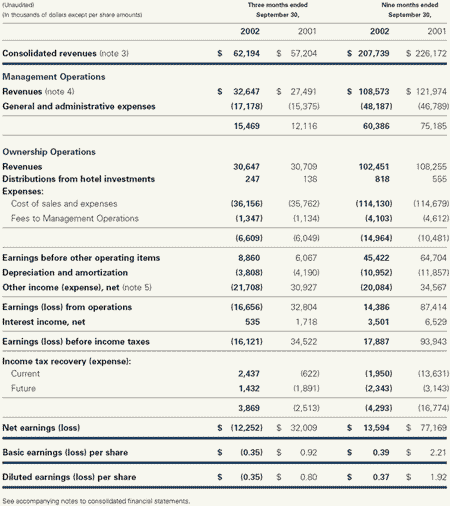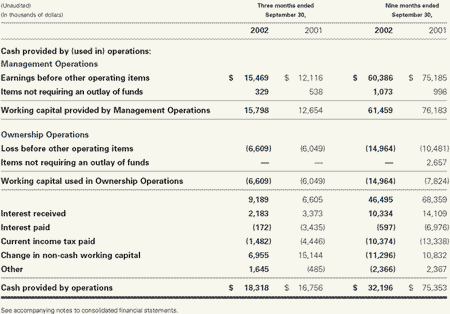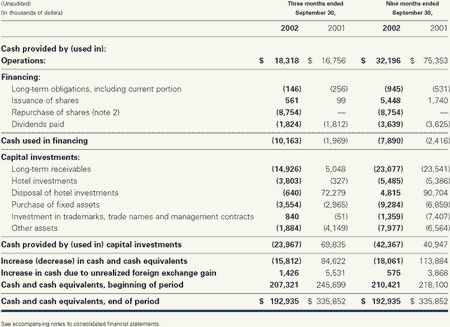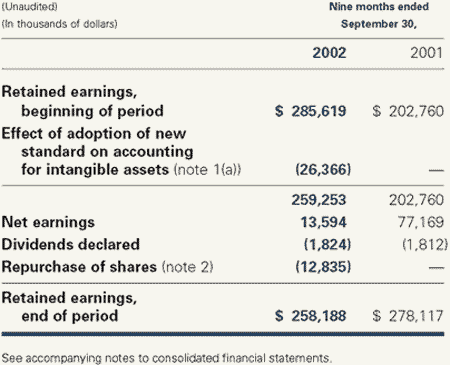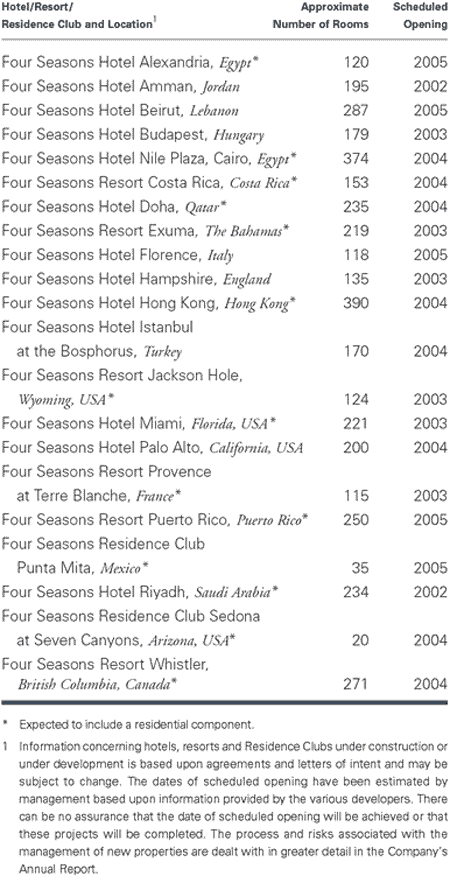Management’s Discussion and Analysis As of November 8, 2002 The following should be read in conjunction with the accompanying consolidated financial statements and with the Management’s Discussion and Analysis and the consolidated financial statements contained in the Company’s 2001 Annual Report. Earnings After taking an asset impairment charge, the Company realized a net loss of $12.3 million ($0.35 basic and diluted loss per share) for the three months ended September 30, 2002, as compared to net earnings of $32.0 million ($0.92 basic earnings per share and $0.80 diluted earnings per share) for the third quarter of 2001. The third quarter financial results include an asset impairment charge, net of applicable income taxes, of $17.5 million ($0.50 basic and diluted loss per share) relating to the Company’s investments in Four Seasons hotels in Caracas and Sydney. Included in net earnings for the third quarter of 2001 was approximately $29 million ($0.83 basic earnings per share and $0.72 diluted earnings per share) relating to gains realized by the Company, net of applicable income taxes, on the disposition of its interests in Four Seasons Hotel Prague and The Regent Hong Kong. For the nine months ended September 30, 2002, net earnings were $13.6 million ($0.39 basic earnings per share and $0.37 diluted earnings per share), as compared to net earnings of $77.2 million ($2.21 basic earnings per share and $1.92 diluted earnings per share) for the comparable period in 2001. Hotel Operating Results The continued volatility of the equity markets, a delayed recovery in the global economy, and ongoing geopolitical concerns have continued to cause unprecedented volatility in business travel on a global basis. Leisure travel, while generally strong, is also being negatively affected in certain areas. In addition to these more general factors, specific local events have caused unanticipated disruptions to the operations of certain of the Company’s properties. As a result of a dispute with its owner, Four Seasons Hotel Caracas has been effectively closed. The hotel is expected to remain closed until the dispute is resolved and the hotel’s debt and working capital arrangements can be restructured to provide sufficient funds to allow the property to operate on the basis specified in the Company’s management agreement. In the third quarter, Four Seasons Hotel Prague closed because of severe flooding. The Regent Hotel Jakarta, which was also closed because of flooding in February of this year, has not yet reopened. The two Four Seasons resorts in Bali are experiencing significant cancellations following the recent acts of terrorism in the area. As well, the New York market continues to have particular difficulty recovering from the events of and following September 11, 2001, which has significantly affected Four Seasons because of the Company’s 100% ownership interest in The Pierre, and the fees that Four Seasons normally earns in that market. Four Seasons’ customer base consists of business travellers, groups (including corporate and incentive) and leisure travellers. During the quarter, hotels continued to experience lower demand from business travellers who typically yield some of the highest room rates. Leisure travel demand was more resilient than business travel during the quarter. However, with the exception of the Company’s two resorts in Hawaii and Four Seasons hotels in Paris and Milan, leisure travel also appears to be softening in the fourth quarter. The ongoing reduced levels of business travel have impacted some of the regions in which the Company operates to a greater extent than others. In the United States, lower than normal travel volumes to New York had a significant impact on the Company as a result of its 100% ownership interest in The Pierre and the incentive fees that the Company normally earns in that market. The Pierre, which typically draws between 30% and 40% of its guests from outside of North America, was particularly affected by the decline in the volume of international travellers to the city. The New York market also has been very hard hit by the depressed level of activity in the US capital markets. Generally, business travel within Europe was weak, with the exception of Paris and Milan and, to a lesser extent, London. RevPAR(1), on a US dollar basis, for worldwide Core Hotels(2) increased 2.1% during the third quarter of 2002, as compared to the same period in 2001. Although consistent with industry levels, overall worldwide occupancy levels at the hotels and resorts under Four Seasons management, particularly in the US, remained below historic levels. Achieved average rate was essentially unchanged for the three months ended September 30, 2002, on a US dollar basis, as compared to the same period in 2001, reflecting the Company’s strategy of maintaining room rates. RevPAR, on a local currency basis, for worldwide Core Hotels increased 0.4% during the third quarter of 2002, as compared to the same period in 2001. The Company is continuing its strategy of maintaining the product and services it has consistently provided to its customers without compromising room rates within a category. Worldwide Core Hotels gross operating profits, on a US dollar basis, increased 1.2% in the third quarter of 2002, as compared to the same period in 2001. On a local currency basis, gross operating profits of worldwide Core Hotels decreased 1.1% in the third quarter of 2002, as compared to the same period in 2001. For the first nine months of 2002, RevPAR, on a US dollar basis, for worldwide Core Hotels decreased 5.7%, and the gross operating profits declined 11.5%, as compared to the same period in 2001. For the first nine months of 2002, RevPAR, on a local currency basis, for worldwide Core Hotels decreased 6.3%, and gross operating profits declined 12.2%, as compared to the same period in 2001. Gross operating profits declined, in part, due to higher costs relating to insurance, energy and employee benefits. During the third quarter of 2002, RevPAR for US Core Hotels, on a US dollar basis, decreased 1.1%, and the gross operating profits declined 8.3%, as compared to the same period in 2001. For the first nine months of 2002, RevPAR for US Core Hotels, on a US dollar basis, decreased 7.6%, and the gross operating profits declined 15.6%, as compared to the same period in 2001. The results for US Core Hotels reflect the continued weakness in the majority of the Company’s US city centre hotels, offset to a limited degree by relative strength in some of the Company’s US resorts during the third quarter. However, leisure travel demand appears to be slowing in the fourth quarter. In the third quarter of 2002, RevPAR for Canada/Mexico/Caribbean Core Hotels, on a US dollar basis, increased 10.1%, and the gross operating profits increased 48.9%, as compared to the same quarter in 2001. For the first nine months of 2002, Canada/Mexico/Caribbean Core Hotels experienced a decrease in RevPAR, on a US dollar basis, of 4.0%, and the gross operating profits declined 7.7%, as compared to the same period in 2001.
|

